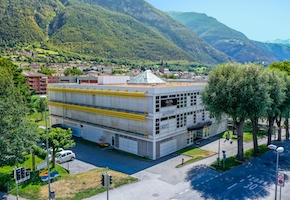- About
- Programs
- Innovation & Research
- Campus Life
- Career Services
- Admissions
- News & Events
- Alumni
The Dual Education System in Switzerland: A Model for Excellence in Education and Innovation
The Swiss education system is a dual modality approach that incorporates work experience via internships and apprenticeships as required curricular activities. It is a proven model of success that Swiss Education Group schools also utilize.
Switzerland’s dual education system is globally recognized for its effectiveness in blending academic learning with practical experience, resulting in a highly skilled workforce and low unemployment. This system is a cornerstone of Switzerland’s reputation for excellence in education and innovation, contributing to its top rankings in global competitiveness and talent development. Swiss Education Group (SEG) schools, which also rank highly in the QS World University Rankings, all follow this dual model. This approach not only enhances the quality of education but also significantly boosts practical skills and employability worldwide, contributing to their own high ranking and global reputation.
The Structure of the Dual Education System
The dual education system in Swiss secondary schools is a unique blend of classroom instruction and on-the-job training. Students split their time between attending vocational schools and working at companies, gaining both theoretical knowledge and practical skills simultaneously. This system is available across various fields from finance, technology, and industrial jobs, to business, hospitality, and healthcare work.
In order to support this system, the Swiss education programs are highly differentiated. Students are placed onto academic tracks starting in secondary level I (middle school). At secondary level II (High School), the system splits again into full-time schools and vocational education.
Full-time schools include Gymnasium, which leads to the Matura (Swiss finishing Diploma) with the objective of preparing students for university. Roughly, only 20% of all students qualify for Gymnasium. This is the only level that does not incorporate vocational education, and students are expected to continue their studies at university before entering the workforce.
Intermediate Schools are full-time schools with an additional component of vocational experience, leading to a Professional Matura. Upon completion, students in this program can either join the workforce or continue to select universities.
Approximately 65% of students directly enter vocational education, a blend of general education and practical work training where students attend school a few days a week and work a paid apprenticeship the other days. This program leads to the Vocational Matura. Students on this track typically join the workforce when finished.
This dual approach ensures a robust and diverse educational foundation with the vast majority of students in some combination of vocational education.
The key to the success of this system is the nationwide collaboration between educational institutions and the private sector. Companies play the critical partner role by providing apprenticeships, mentoring, and real-world experience, while schools focus on delivering the necessary academic foundation. This symbiotic relationship ensures that the curriculum remains relevant to industry needs and that students are well-prepared for the job market.
Click here for a comprehensive diagram of the Swiss education system.
Benefits of the Dual Education System
High Employability: Graduates of the dual education system are highly sought after by employers due to their practical experience and relevant skills. This results in lower youth unemployment rates and a smoother transition from education to employment.
Adaptability and Innovation: The system fosters a culture of continuous learning and adaptability. Students are exposed to real-world challenges early on, making them more innovative and better prepared to handle dynamic work environments.
Economic Impact: By aligning education with industry needs, the dual education system contributes significantly to the Swiss economy. Companies benefit from a skilled workforce, while students gain valuable experience, creating a win-win situation.
Societal Support and Recognition: Due to the integral support and participation by all industries nationwide, the system of apprenticeships is recognized and respected by society as a crucial component in becoming a professional.
Switzerland's Top Rankings in Education and Innovation
Switzerland consistently ranks high in global talent competitiveness and innovation indices. According to INSEAD’s Global Talent Competitiveness Index, Switzerland continues to take first place for developing, attracting, and retaining talent. This is largely attributed to the dual education system, which produces well-rounded professionals equipped with both theoretical knowledge and practical skills.
The country's emphasis on research and development, supported by a strong education system, drives innovation, for which Switzerland also ranks first place, according to the WIPO. Swiss universities and applied sciences institutions collaborate closely with industries, fostering a culture of research and practical application. This synergy between education and industry is a key factor in Switzerland's leadership in innovation.
Swiss Education Group (SEG) and the Dual Education Model
Given the high global ranking of Switzerland in talent, competitiveness and innovation, it is no wonder that SEG schools also rank highly among world universities, considering that they follow the same proven educational structure.
All four SEG schools have long embraced the dual education model, integrating internships and practical experience into their programs. Their location in Switzerland is advantageous due to the country’s long history of working with educational institutions to provide students with work opportunities. The vocational work experience component in SEG schools’ curriculum not only aligns and integrates with the Swiss tradition of combining academic and practical training but also enhances the employability of its graduates.
The Impact of SEG’s Dual Education Approach
Enhanced Learning Experience: By incorporating internships and practical courses, SEG schools provide students with hands-on experience that complements their academic studies. This holistic approach to education ensures that students are well-prepared for their careers.
Industry Connections: SEG schools have strong relationships and partnerships with the hospitality industry, offering students numerous opportunities for internships, networking, and career placements. This network is invaluable for students looking to launch successful careers in hospitality.
Global Recognition: Highly ranked year after year in the QS World University Rankings, SEG schools have established themselves in the global arena of hospitality education. César Ritz Colleges Switzerland’s recent accreditation as a Swiss University of Applied Sciences by the Swiss Accreditation Council further enhances its reputation, making its degrees more valuable in the Swiss job market. This accreditation also offers research opportunities to students and facilitates ease of credit transfers and further academic opportunities for students within Switzerland and globally.
Innovative Programs: SEG schools continuously update their programs to reflect industry trends and demands. For instance, HIM allows for customization of its BBA degree via specializations in Luxury Brand Management and Financial Analysis and Wealth Management, two key areas of interest for the current Gen Z demographic. Swiss Hotel Management School also offers Event Management and Design Management to customize it’s bachelor’s degree in addition to the traditional Hospitality Management subjects. Culinary Arts Academy Switzerland is unique in the arena of culinary schools offering a full Bachelor’s Degree in Culinary Arts and Business, meeting the demand for both a bachelor’s degree and training in the increasingly popular culinary industry.
The Future of Education at SEG
The dual education system in Switzerland is a powerful model that blends academic learning with practical experience, producing highly skilled and adaptable professionals. This system is a key factor in Switzerland’s top rankings in education and innovation. SEG schools embody this model by integrating internships into their curricula, contributing to their high ranking among schools by ensuring that students receive a comprehensive and practical education, and high employability upon graduation.
As SEG continues to innovate and expand its programs, it will remain at the forefront of hospitality, culinary, and business education, preparing students for successful careers in a competitive global market.
Learn more about the top world-ranking schools of Swiss Education Group. Download our brochure to discover our four unique schools.
Originally published on Swiss Education Group.
#Academics
















